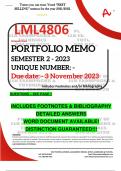Tutors you can trust. Voted “BEST
SELLING” memos for the year 2021/2022.
LML4806
Company Law
PORTFOLIO MEMO
SEMESTER 2 - 2023
UNIQUE NUMBER: -
Due date: - 3 November 2023
Includes Footnotes and/or Bibliography
QUESTIONS – SEE PAGE 1
INCLUDES FOOTNOTES & BIBLIOGRAPHY
DETAILED ANSWERS
WORD DOCUMENT AVAILABLE!
DISTINCTION GUARANTEED!!!
Disclaimer
Extreme care has been used by our Tutors to draft this document, however the contents are provided “as is” without any representations
or warranties, express or implied. This document is to be used for comparison, research and reference purposes ONLY. No part of this
document may be reproduced, resold or transmitted in any form or by any means without prior written permission from the Author. –
LLB EXAMPACKS & TUTORIALS.
PAST PAPERS & MEMOS, ASSIGNMENT MEMOS, NOTES, SUMMARIES & TUITONS.
Cell: 062 810 8624 Email:
Fax: 086 096 5452 www.llbexampacksandtutorials.co.za
, QUESTION 1
1.1 Briefly outline the values that are embodied in the African philosophy of ubuntu
and discuss, with reference to the Companies Act 71 of 2008, whether the values
of ubuntu have been infused in the law regulating companies in South Africa. (10)
Ubuntu refers to the saying umuntu ngumuntu ngabantu, which means a person is a
person through others. In the case of S v Makwanyane 1995 (6) BCLR 665 (CC), Madala
J expressed the view that ubuntu advocates social justice and fairness.
Ubuntu was given explicit application in our jurisprudence in the highest court in S v
Makwanyane 1995 (6) BCLR 665 (CC). Madala J noted that ubuntu advocates social
justice and fairness.
In Pharmaceutical Society of South Africa and Others v Tshabalala-Msimang and Another
NNO; New Clicks South Africa (Pty) Ltd v Minister of Health and Another 2005 3 SA 238
(SCA), para 38, Harms JA describes ubuntu as a relationship of mutual respect. In a
similar vein, in Koyabe and Others v Minister for Home Affairs and Others (Lawyers for
Human Rights as Amicus Curiae) 2010 4 SA 327 (CC), Mokgoro J associated ubuntu with
a general obligation to treat people with respect and dignity, to avoid undue confrontation
and to give reasons for administrative decisions.
The second report issued by the Institute of Directors in Southern Africa, the King Report
on Corporate Governance, 2002, first canvassed the notion of introducing African
business values to be applied in South Africa, which is now summarised as ubuntu.
Although certain universal principles will always be applied in decision-making in
business, ubuntu has become an important principle which also permeates the latest King
Report on Corporate Governance, 2016 (“King IV”). The importance of ubuntu in the
South African context is recognised where it states that “the common purpose of all
human endeavours, individual or corporate, should be that of service to humanity” (King
IV 24).





